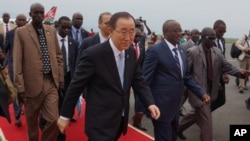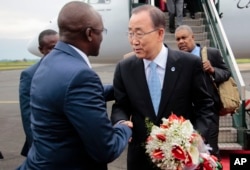Burundi leaders said they had positive and constructive discussions with U.N. Secretary General ban Ban Ki-moon during his visit to Bujumbura.
Ban arrived in the country Monday to meet with President Pierre Nkurunziza and other politicians as part of ongoing U.N. efforts to resolve Burundi’s political crisis.
Foreign Minister Alain Nyamitwe said his government told the secretary general that Burundi is interested in dialogue but if such dialogue is to be truly inclusive, it must cater to as many Burundians as possible and not just a select few.
“I can say that those meetings went very well and very positive, and very constructive. He has come to listen to Burundian stakeholders to get a better idea of the situation on the ground and what could be the best way possible in the search for a durable and sustainable understanding of our situation,” he said.
Who should participate in crisis talks
East Africa Community-mediated peace talks with Burundi's warring factions have been led by Ugandan President Yoweri Museveni but so far have failed to yield practical results.
There has been disagreement on who should participate in the inter-Burundian dialogue.
The Burundian government has said it will not negotiate with certain opposition figures who it considers as “coup plotters” or “sponsors of acts of terrorism”.
Foreign Minister Nyamitwe said any Burundian can be part of the dialogue as long as they adhere to U.N. Security Council resolution 2248 which calls on the government and all parties to reject violence and refrain from any action that threatens peace and stability.
Jean Minani, the exiled leader of the Opposition Front for Democracy in Burundi (FRODEBU) told VOA recently that President Pierre Nkurunziza does not want to negotiate with the opposition because he knows he’s the cause of the crisis Burundi is experiencing today.
Resistance to outside peacekeeping force
On the visit to Bujumbura later this week by a delegation of African leaders, Nyamitwe said his government welcomes the visit and looks forward to discussing with the leaders the way forward in Burundi
The French News Agency reported Monday that France had put forward a draft proposal at the United Nations to deploy a U.N. police force in Burundi to help quell the violence.
Nyamitwe said his government had not heard of the French proposal. But he said if Burundi were to be consulted it would not accept the deployment of any such force and would not accept any such force through the United Nations.
“Our position has been and has remained the same. We don’t favor options that would end up deploying troops or forces on the ground simply because we believe we have the capacity to protect the population on the ground,” Nyamitwe said.
The political crisis and resulting violence over the past year has killed more than 400 people in Burundi and caused about 230,000 to flee the country.












